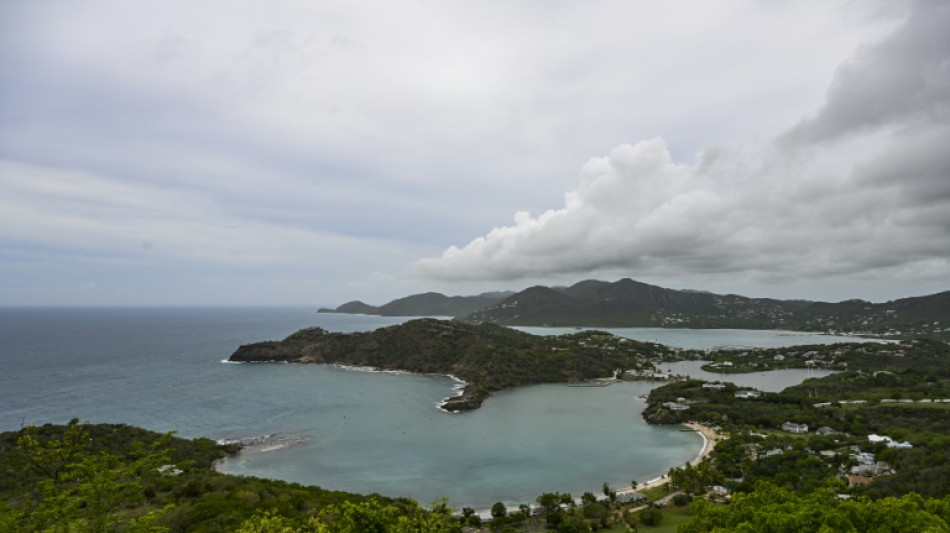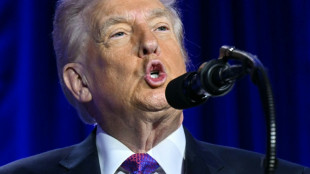
-
 Barca beat Mallorca to extend Liga lead
Barca beat Mallorca to extend Liga lead
-
Gyokeres lifts Arsenal nine clear as Man Utd pile pressure on Frank

-
 Late Guirassy winner for Dortmund trims Bayern's lead atop Bundesliga
Late Guirassy winner for Dortmund trims Bayern's lead atop Bundesliga
-
'Free the mountains!": protest in Milan over Winter Olympics

-
 Gyokeres double helps Arsenal stretch Premier League lead
Gyokeres double helps Arsenal stretch Premier League lead
-
BMW iX3 new era SUV

-
 Six Nations misery for Townsend as Italy beat sorry Scotland
Six Nations misery for Townsend as Italy beat sorry Scotland
-
Spain, Portugal face fresh storms, torrential rain

-
 Opinions of Zuckerberg hang over social media addiction trial jury selection
Opinions of Zuckerberg hang over social media addiction trial jury selection
-
Over 2,200 IS detainees transferred to Iraq from Syria: Iraqi official

-
 Norway's Ruud tops Olympic men's freeski slopestyle qualifying
Norway's Ruud tops Olympic men's freeski slopestyle qualifying
-
Czech qualifier Bejlek claims first title in Abu Dhabi

-
 French duo reach Shanghai, completing year-and-a-half walk
French duo reach Shanghai, completing year-and-a-half walk
-
Australian snowboarder James eyes elusive Olympic gold

-
 Sequins and snow: Eva Adamczykova makes Olympic return
Sequins and snow: Eva Adamczykova makes Olympic return
-
Vonn set for Olympic medal bid after successful downhill training

-
 Shepherd takes hat-trick as West Indies beat Scotland in T20 World Cup
Shepherd takes hat-trick as West Indies beat Scotland in T20 World Cup
-
Sausages will sell after thrill-seeker Von Allmen wins Olympic downhill

-
 Swiss racer Von Allmen wins first gold of Winter Olympics
Swiss racer Von Allmen wins first gold of Winter Olympics
-
'Wake up': Mum sparks comeback after scare for freeski star Gu

-
 Von Allmen wins men's Olympic downhill gold, first of Games
Von Allmen wins men's Olympic downhill gold, first of Games
-
First medals up for grabs at Winter Olympics

-
 Afghanistan captain Khan harbours dream of playing in Kabul
Afghanistan captain Khan harbours dream of playing in Kabul
-
Lindsey Vonn completes second Winter Olympics downhill training run

-
 Freeski star Gu survives major scare in Olympic slopestyle
Freeski star Gu survives major scare in Olympic slopestyle
-
Iran FM looks to more nuclear talks, but warns US

-
 Hetmyer's six-hitting steers West Indies to 182-5 against Scotland
Hetmyer's six-hitting steers West Indies to 182-5 against Scotland
-
After boos for Vance, IOC says it hopes for 'fair play'

-
 Thousands gather as Pakistan buries victims of mosque suicide attack
Thousands gather as Pakistan buries victims of mosque suicide attack
-
Lindsey Vonn completes second downhill training session

-
 US pressing Ukraine and Russia to end war by June, Zelensky says
US pressing Ukraine and Russia to end war by June, Zelensky says
-
Faheem blitz sees Pakistan avoid Netherlands shock at T20 World Cup

-
 Trump refuses to apologize for racist clip of Obamas as monkeys
Trump refuses to apologize for racist clip of Obamas as monkeys
-
Takaichi talks tough on immigration on eve of vote

-
 England's Salt passed fit for T20 World Cup opener
England's Salt passed fit for T20 World Cup opener
-
Spain, Portugal brace for fresh storm after flood deaths

-
 Pakistan bowl out Netherlands for 147 in T20 World Cup opener
Pakistan bowl out Netherlands for 147 in T20 World Cup opener
-
Pushed to margins, women vanish from Bangladesh's political arena

-
 Crypto firm accidentally sends $40 bn in bitcoin to users
Crypto firm accidentally sends $40 bn in bitcoin to users
-
Pistons end Knicks' NBA winning streak, Celtics edge Heat

-
 Funerals for victims of suicide blast at Islamabad mosque that killed at least 31
Funerals for victims of suicide blast at Islamabad mosque that killed at least 31
-
A tale of two villages: Cambodians lament Thailand's border gains

-
 Police identify suspect in disappearance of Australian boy
Police identify suspect in disappearance of Australian boy
-
Cuba adopts urgent measures to address energy crisis: minister

-
 Not-so-American football: the Super Bowl's overseas stars
Not-so-American football: the Super Bowl's overseas stars
-
Trump says US talks with Iran 'very good,' more negotiations expected

-
 Trump administration re-approves twice-banned pesticide
Trump administration re-approves twice-banned pesticide
-
Hisatsune leads Matsuyama at Phoenix Open as Scheffler makes cut

-
 Beyond the QBs: 5 Super Bowl players to watch
Beyond the QBs: 5 Super Bowl players to watch
-
Grass v artificial turf: Super Bowl players speak out


World's island states meet to confront climate, fiscal challenges
Extremely vulnerable to climate change, not rich enough to stop it on their own, and not poor enough to depend on aid and development financing: the world's small island countries are bracing for both fiscal and climate shocks.
Both will be high on the agenda this week as Small Island Developing States (SIDS), as they're formally known, meet Monday at their fourth UN Conference, in the Caribbean nation of Antigua and Barbuda.
Caught between rising debts and rising oceans, from the Caribbean to Africa to the Pacific, many SIDS share characteristics that make them especially vulnerable to external shocks: small landmasses home to scattered and isolated populations, with import dependent, non-diversified economies.
And climate change -- with its brutal droughts, powerful hurricanes and rising seas -- is threatening to erase some of them from the map altogether.
"The next ten years are critical for SIDS," reads the draft document set to be adopted at the UN conference, which will bring together countries ranging from Asian economic heavyweight Singapore to Cape Verde in Africa to the Bahamas.
High on the agenda for the 39 states, whose populations number roughly 65 million people: increasing climate financing, even as many criticize the slow pace of fulfilling previous UN aid pledges.
"The harsh truth is for these countries, climate change is already a reality," Achim Steiner, head of the UN Development Program (UNDP), told AFP. "Because of their smallness as economies... one extreme weather event can literally throw a country back 5-10 years in its development."
"One hurricane, one typhoon that crosses -- by sheer lottery of bad luck -- the terrain of a small island developing state can wipe out a third or more of the entire infrastructure of a country."
But most small island states are classified as middle-income countries or higher -- meaning that they're unable to access international aid and preferential financing available to the world's poorest countries.
Additionally, many already are also facing strained debt loads. As a whole, the UN estimates SIDS will spend 15.9 percent of government revenues in 2024 on interest alone.
"They are being trapped in a no man's land where financing from the international community that is often a kind of safety net is simply not available to them," Steiner said.
According to the UNDP, some $4.7-7.3 billion in financing is needed per year just for climate adaptation measures in SIDS countries.
"SIDS cannot be left to drown in crises not of their own making. This would have catastrophic consequences for the entire world," said Fatumanava-o-Upolu III Dr Pa'olelei Luteru, Samoa's ambassador to the UN.
- 'Blue economy' -
Beyond seeking outside aid, however, many are also turning toward reforming their own economies.
Priorities include developing renewable energy sectors and engaging in the so-called "blue economy" of sustainable fishing and ocean conservation -- a serious opportunity for SIDS countries, which account for 19 percent of the world's Exclusive Economic Zones.
Tourism, too, can be made more sustainable -- though the specter of climate change hangs over these countries' marine biodiversity and coral reefs, which draw scuba divers from across the world.
Even just getting there has increasingly come under scrutiny as airplane travel comes under fire for its heavy emissions -- a sort of "double punishment," said Steiner.
The effects of climate change also overlap with other issues many poor or otherwise marginalized people in small island countries face, which must be confronted domestically, said Nicole Leotaud, executive director of the Caribbean Natural Resources Institute.
"They are already marginalized because they are poor," she said. "They are already marginalized because of their gender or their race."
"And these climate impacts are another layer of injustice to these people."
N.Awad--SF-PST


